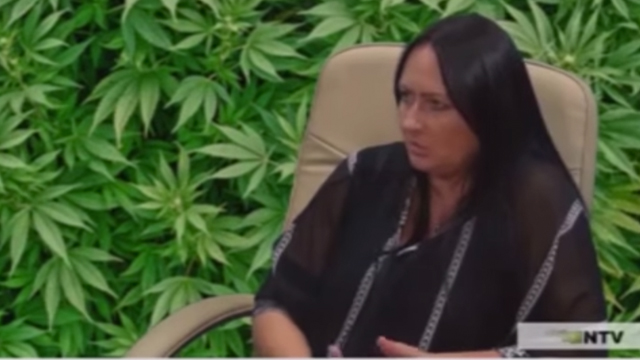A struggle for making medical cannabis legal in Poland: an article by Iga Jeziorska on our new video produced by Paweł Libera and the Polish Drug Policy Network.
“Let us live and save our loved ones.” These powerful words from Dorota Gudaniec convey a simple message to Polish and international drug policy-makers. Medicinal cannabis is saving lives, but people willing to try this kind of treatment are still considered criminals and may face criminal charges and sanctions, including up to three years in prison for possession of a controlled substance. Our new video, produced by Paweł Libera and the Polish Drug Policy Network, provides some insights into the medicinal cannabis situation in Poland.
Dorota Gudaniec, called by some people “the Mother of Medical Marijuana”, is nowadays one of the most recognisable and toughest medicinal cannabis activists in Poland, meeting with politicians, attending public hearings in Parliament, blogging, and trying to educate the public about the issue. But how did she get to where she is now? Dorota’s journey to medicinal marijuana activism began back in 2014. Looking for help for her son – five-year-old Max, born with Down’s syndrome and suffering from medicine-resistant epilepsy – she was advised to try CBD oil. In a critical moment, when Max was literally dying – with significant help from doctor Marek Bachański (we published his story here) – she managed to finalise the complicated and time-consuming procedure of direct importation, to bring Bediol into Poland from the Netherlands.
Since the introduction of cannabis treatment, Max’s condition has improved significantly. As Dorota reports: “The most important part of this whole therapy, apart from the fact that he no longer has seizures, is that he can feel and show his emotions. For the first five years of his life, he didn’t express any feelings: didn’t smile, didn’t show any facial expressions – he was like a living doll. After starting cannabis therapy, Max had the first seizure-free month of his life. It was so amazing, it’s impossible to describe it”. What Dorota wants to achieve, is a situation where in Poland, a country of 40 million, people suffering from various diseases, or with sick relatives, will no longer be treated as criminals.
Similar views are expressed by doctor Jerzy Jarosz, an anesthesiologist specialising in pain management, and founder of a counselling centre advising on the medical uses of cannabis. According to doctor Jarosz, there is a big need among doctors and nurses for acknowledging the medical use of cannabis. For specific cases, the medical profession often deny patients the right to include medical marijuana in therapy, but in general, they tend to be in favour of such treatment, or at least not strongly opposed to it. And, despite there being a huge number of cannabis medical properties and potential uses, there is also a shortage of scientific proof of the effectiveness of marijuana treatment.
The few conditions that research indicates as being treatable with cannabis are spastic forms of multiple sclerosis and neuropathic pain. More and more research is being conducted on various forms of cancer, with a lot of incidental evidence of the effectiveness of cannabis in treating them, or at least slowing their growth. This is still, however, not enough for cannabis to be widely accepted as a medicine. “The biggest barrier is lack of knowledge,” says doctor Jarosz. “Indeed, there is nowhere to go to find out about the medical uses of cannabis. There is a need for research establishing recommended uses, dosage, and contraindications.”
Patients, their families, and some doctors continue their fight for better access to medications and public education on the subject. But what does the situation look like at a political and policy level? “Narcophobia is very strong within the political class, or maybe rather, within political strategy,” says Piotr Pacewicz, a journalist involved in the medical cannabis legalisation movement. “Psychoactive substances are believed to be a ‘dangerous subject’, which may expose proponents to strong criticism”. Two surveys, however, conducted on two very different newspapers’ websites (a liberal and a conservative one), show that the vast majority of Polish people support the medical use of cannabis. The results of the surveys were especially surprising on the conservative side.
Even more surprising – at the beginning of March, lots of newspapers headlines shouted: “Medical cannabis not only legal, but also refunded in Poland!”. Such an announcement, especially coming from a very conservative government, was quite unexpected. Hundreds of thousands of people were looking forward to the new possibilities for treatment. Later, however, they experienced disappointment, for the headlines were quite misleading. The state did indeed decide to refund medical cannabis, but the scheme is quite restrictive. Sativex is excluded from refund, while Bedrocan may be refunded, but may still only be obtained by direct import, which is very far from legalisation.
Another morsel of hope was provided to patients by a Member of Parliament, Piotr Liroy-Marzec, who submitted an amendment to the Act on Countaracting Drug Abuse. His proposal included the compilation of a list of doctors authorised to treat their patients with medical marijuana, as well as licensing cultivation for personal medical purposes. The proposed amendment was accepted by the Polish Parliamentary legislative committee – which was again reported as being a significant victory for the medicinal cannabis reform movement. Unfortunately, after passing the legislative committee, the amendment was re-directed for notification to all the EU member states. In practice, this means that doctors, patients, and their families may be forced to wait years for the new regulations to come into force.
It is certain that the issue of medicinal cannabis in Poland has developed quite quickly in recent years. What is especially noticeable is the change in public opinion. Parents of sick children, patients, activists, and even some members of the clergy are openly talking, in the mainstream media, about the benefits of medicinal cannabis. For the political class, however, the goal seems to be to simply give people a small fraction of what they are asking for, in order to create a smokescreen and avoid real change. This is why we can’t rest on our laurels, but educate, advocate, and demand.
Iga Jeziorska





